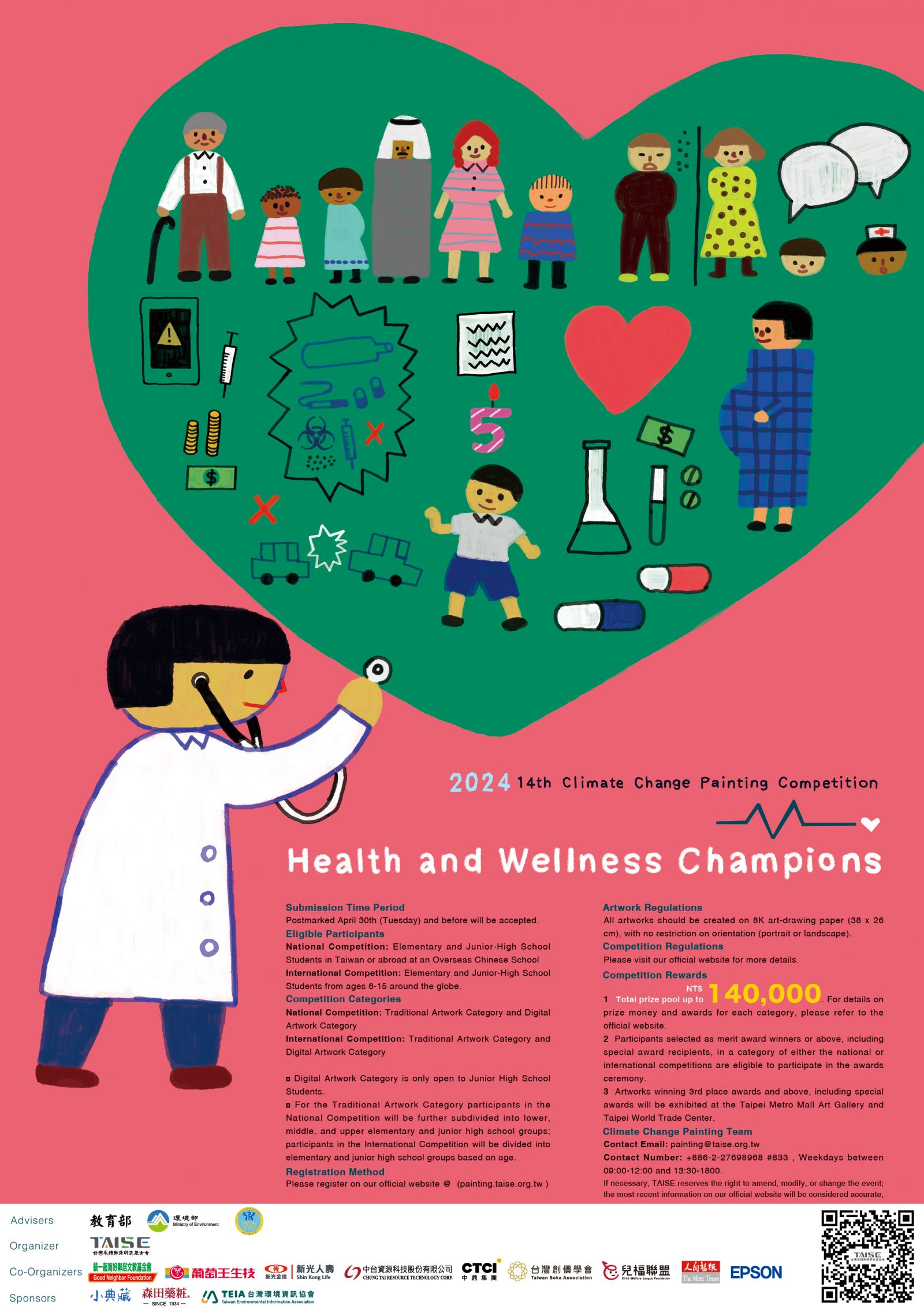The 2024 theme is now revealed! New addition: Digital Artwork Category !
Dear friends, the much-anticipated theme for the 14th Climate Change Painting Competition in 2024 has been officially announced!
The global COVID-19 pandemic that has raged for nearly three years has changed many aspects of humankind's lifestyles while simultaneously impacting our physical and mental well-being. During the pandemic, children in particular experienced school closures and remote learning, leading to a significant increase in nearsightedness rates, a significant decrease in concentration, and even the emergence of emotional issues and other after-effects like 3C addiction (Computer/Communication/Consumer electronics addiction). The United Nations Climate Change Conference (COP28), which took place in Dubai December 2023, included health and wellness as a central theme. December 3rd was designated as the inaugural "Health Day" for this conference, aiming to remind the public to pay attention to health crises brought about by climate change.
Therefore, the theme of 2024 14th Climate Change Painting Competition aligns with UN SDGs #3, "Good Health and Well-Being." Through the theme "Health and Wellness Champions", our aim is to raise awareness of infectious diseases among teachers and students, fostering collective discussion on preventive measures against infectious diseases. Simultaneously, there will be a focus on learning about healthy lifestyles, emotional management, as well as gaining a comprehensive understanding of UN SDGs #3’s sub-goals contents. Together, let's stride towards a healthy and sustainable lifestyle.
For detailed sub-goals, please refer to the following. Any content related to the sub-goals can be used for the drawing!
3.1 By 2030, reduce the global maternal mortality ratio to less than 70 per 100,000 live births.
3.2 By 2030, end preventable deaths of newborns and children under 5 years of age, with all countries aiming to reduce neonatal mortality to at least as low as 12 per 1,000 live births and under‑5 mortality to at least as low as 25 per 1,000 live births.
3.3 By 2030, end the epidemics of AIDS, tuberculosis, malaria and neglected tropical diseases and combat hepatitis, water-borne diseases and other communicable diseases.
3.4 By 2030, reduce by one third premature mortality from non-communicable diseases through prevention and treatment and promote mental health and well-being.
3.5 Strengthen the prevention and treatment of substance abuse, including narcotic drug abuse and harmful use of alcohol.
3.6 By 2020, halve the number of global deaths and injuries from road traffic accidents.
3.7 By 2030, ensure universal access to sexual and reproductive health-care services, including for family planning, information and education, and the integration of reproductive health into national strategies and programmes.
3.8 Achieve universal health coverage, including financial risk protection, access to quality essential health-care services and access to safe, effective, quality and affordable essential medicines and vaccines for all.
3.9 By 2030, substantially reduce the number of deaths and illnesses from hazardous chemicals and air, water and soil pollution and contamination.
3.a Strengthen the implementation of the World Health Organization Framework Convention on Tobacco Control in all countries, as appropriate.
3.b Support the research and development of vaccines and medicines for the communicable and non-communicable diseases that primarily affect developing countries, provide access to affordable essential medicines and vaccines, in accordance with the Doha Declaration on the TRIPS Agreement and Public Health, which affirms the right of developing countries to use to the full the provisions in the Agreement on Trade-Related Aspects of Intellectual Property Rights regarding flexibilities to protect public health, and, in particular, provide access to medicines for all.
3.c Substantially increase health financing and the recruitment, development, training and retention of the health workforce in developing countries, especially in least developed countries (LDCs)and small island developing States (SIDS).
3.d Strengthen the capacity of all countries, in particular developing countries, for early warning, risk reduction and management of national and global health risks.
In addition, to further promote a paperless approach and align with current trends in digital art, this year's competition introduces a ' Digital Artwork Category.' By adding this category, we hope to encourage a diverse range of creations, discover talented digital artists, and provide them with a platform to showcase their skills. If teachers and students are interested in digital drawing, we welcome you to participate in this exciting new category!
